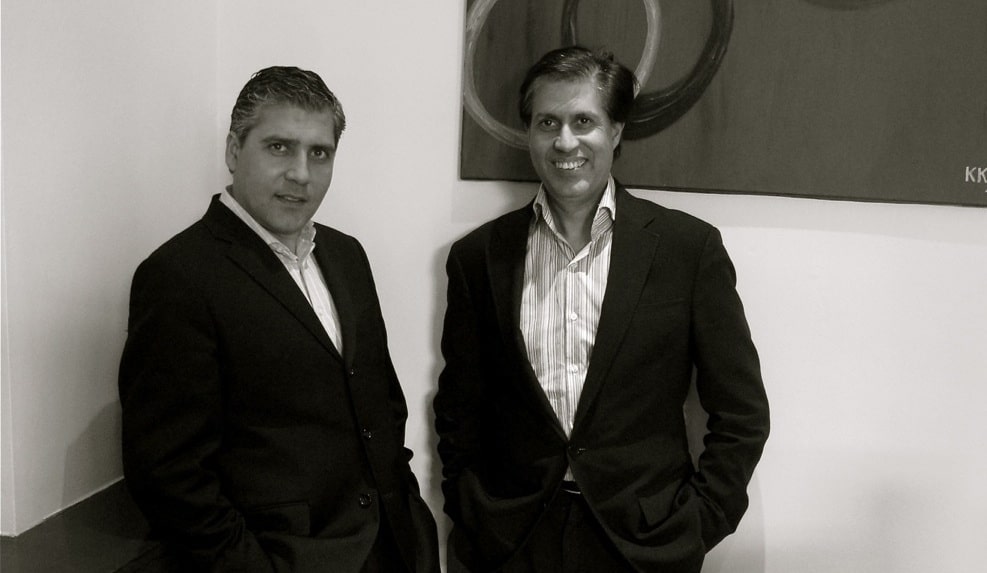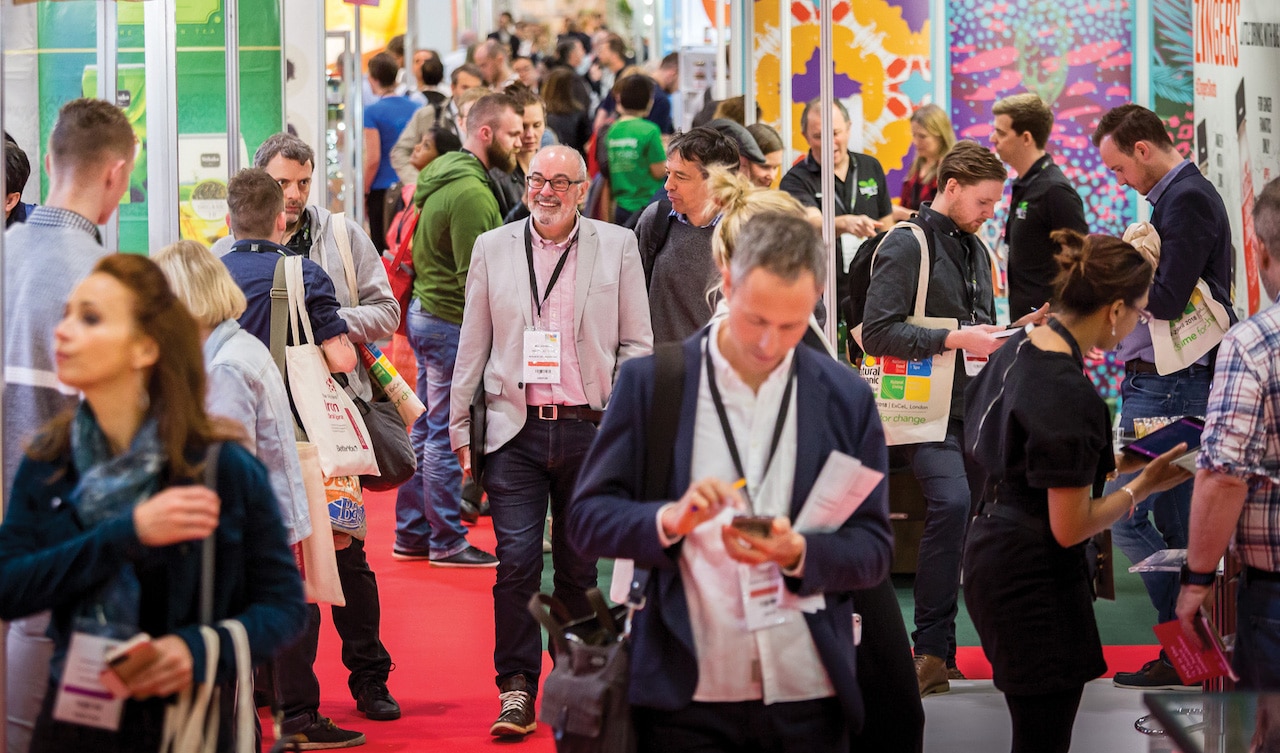Alexander and Kim Barani are two of the health food trade’s biggest personalities, while their company Kinetic is one of the best known names in the business.
Jim Manson talks to them here and and hears how a respect for nature learnt in childhood inspired the passion that still drives their award-winning business today
Natural Products: Alex, Kim, can you tell me about your earlier life and how, and why, Kinetic first came into being?
Alex Barani: Well, we were both brought up in North Africa and it was a very pure and natural environment. We were surrounded by orange groves, the food we ate was vegetarian, we were close to a beautiful unspoilt coastline. So I think an interest in nature and the value and benefits of natural products was with me from a very young age.
Early on I pursued my first big passions — music and fashion. After coming to England and getting my degree in PR and Marketing I was determined to invest these new skills and qualifications in a field that I felt excited about. That was important to me — to be true to myself, and the things in life that I was passionate about. Music and fashion are exciting and fast-moving, but they’re also cut-throat businesses. And I soon found myself looking for another industry that resonated for me personally.
Then out of the blue I met the people behind Haar Sana, the natural haircare brand. That meeting was the trigger point that eventually led to the Kinetic business. It was 1992, and suddenly I found myself part of the health food industry!
Kim Barani: We came from a prominent business family and that was my big inspiration and early lesson in life. From a very young age I was learning the art of being an entrepreneur, much of it from my grandfather. These early experiences drew me towards a career in business and in the early 1990s I came to England to take a degree in International Finance and Business.
When I qualified I began work in London as a stockbroker. It was a good career, but I realised it wasn’t where I wanted to be. As Alex was saying, we were brought up in North Africa — in Tunisia. We had a natural approach to life. We ate food that was in season, we had a natural respect for nature, and each other.
It was those things that made me feel very comfortable investing in a young natural products company — Kinetic. Those early influences are still important to me.
NP: Was there a breakthrough moment for the business?
AB: The real breakthrough for us was getting Jason in 1994. It was such an innovative, exciting and colourful range. It also was the only truly comprehensive natural beauty range available — we had the whole spectrum of categories under one umbrella. They were also the first topical nutrition range that UK retailers had seen.
NP: Can you describe the health food trade as you first encountered it in the early 1990s?
AB: Well, it was very different at that time. It was certainly at a different stage of development from Europe, where pharmacy was the main channel for natural products. In Britain, a dedicated health food trade was emerging, and that appealed to me.
“The real breakthrough for us was getting Jason in 1994. It was such an innovative, exciting and colourful range. It also was the only truly comprehensive natural beauty range available — we had the whole spectrum of categories under one umbrella.”
Sure it was tough in the early days. But right from the beginning people were so welcoming to us — whether it was Raj at Revital or Sandra and Richard at Salisbury Health, or Mrs Hards at Solihull. It was the best introduction you could have. You know, we were foreign, we were turning up at stores with a foreign brand — but people gave us time, and were very nice to us!
KB: The emphasis at that time with bodycare was much more on non-animal testing — there really wasn’t as much awareness of organic or the purity of ingredients. Bascially, there were two types of store. There were the ones who just didn’t believe in bodycare products, or who just thought it was a very secondary activity. We believe Kinetic in many ways pioneered the bodycare section in those types of stores. Then there were the stores who were active in the category and were really interested in having something better.
The main competition then was The Body Shop. Our challenge was to draw shoppers out of Body Shop into health stores.
NP: What factors helped you meet that challenge?
AB: A big advantage to us was the fact that Jason has always been a strong educator. We were also learning so much at the time from our visits to America. Jason was also one of the first brands to be properly merchandised — block merchandised. So it all added up to a big impact.
At the same time we were pioneering the new concept of topical nutrition. And this got me interested in the wider aspects of nutrition and the holistic function of herbs and botanicals.
NP: And was that when you began to bring on board the other big brands you’re now so closely associated with?
KB: That’s right. You have to earn the respect of these big brands. And we were aiming to build long-term relationships. We literally were travelling the globe, discovering a world of exciting new products. Nature’s Answer came in 2000. Then Emergen-C and Renew Life. And by this stage we were starting to develop a vision of Kinetic as a true one-stop ethical shop for natural products retailers.
AB: We’ve been gradually completing the links in the chain. First we indentify a gap in the natural products market, and then we aim to fill those gaps with brand leaders. For example, we had the first range of essential fatty acid products in the form of Health From the Sun — eventually bought by Arkapharma. We’ve also been very visionary in other new areas such as superfoods — with Klamath blue-green algae, and were looking early on at digestive care with Renew Life. We also spotted the first comprehensive natural cosmetics range in Elysambre — and offered it to UK retailers.
NP: What do you look for in any brand you take on, and what does Kinetic offer in return?
KB: One thing is so imporatnt. If we can’t feel the right vibe, we won’t get involved. We really choose who we want to do business with. We’ve been offered distributorships for lots of big brands over the years. But if the relationship didn’t feel right, we’ll walk away. Most of our brands are family-owned businesses — Dr Bronner and Natures Answer, for example. We want to work with manufacturers who have their own facilities. That’s so important in terms of demonstrating traceability. We really look at supplier ethics.
“One thing is so imporatnt. If we can’t feel the right vibe, we won’t get involved. We really choose who we want to do business with. We’ve been offered distributorships for lots of big brands over the years. But if the relationship didn’t feel right, we’ll walk away”
AB: To be successful you have to be a partner with your supplier. To understand more about our suppliers’ products, we spend time in their facilities, talk with their R&D, sales and marketing team, and receive full product training. So, there is a lot of engagement that goes beyond distribution aspects of the business.
What do we offer? We give the brands an extension of their business — and they see the result of our commitment. We give total support. We go to all the big shows and we invest seriously in our brands.
KB: We’re also fully stocked. It’s a logistical achievement that’s been built up over years, not something that happened overnight — and we’ve had to put considerable investment into IT. But we’re in a good place now. In 2009 we were 97% in stock on a daily basis.
NP: How has the economic downturn affected Kinetic and the trade generally?
KB: We heard lots of talk about recession and we took a view we wouldn’t be part of it! That’s not being flippant, it’s deciding on the psychological place you want to be. Of course you can’t influence the wider economy, but you can decide that you will make the most of the situation.
AB: You definitely have to offer more benefits to your customers, when the climate is tough and the chips are down. I still think health food stores have a very positive future — the outlook is good long-term, definitely. The great attribute of the health food sector is that people are prepared to take on a challenge.
“I still think health food stores have a very positive future — the outlook is good long-term, definitely. The great attribute of the health food sector is that people are prepared to take on a challenge.”
KB: I think one effect of the recession is we’ll see a cleaning up in the market. The vulnerable businesses are those without a real vision — not just a vision for their business, but also a vision of what there business is about. But for some stronger and confident businesses the recession has offered an opportunity — say, to sign a lease on bigger store premises. Look at the great refurbishment and relocation Greenlife in Totnes and Earthfare in Glastonbury have been doing. In the end, if your strategy is strong and you buy wisely you can still do well. The market is definitely still there.
NP: What are your proudest achievements from Kinetic’s first 15 years?
AB: Where we’ve got in just 15 years is the single biggest thing — what an amazing journey! And the great relationships we’ve built along the way. A big high point was when we were invited to the States by Jason to receive their Outstanding Contribution Award. We’ve got a wall full of awards in the office!
And it’s great to be able to give something back — whether it’s getting behind a charity like War Child with Dr Bronner or being involved in a local community.
KB: I think for me it is knowing that you have gained the respect of retailers and consumers for being a professional, quality-led and ethical business. We regard it as a real honour when the major brands we represent ask us our opinion on key developments, strategy and NPD.
NP: Finally, you are both big personalities in the natural and organic industry. How do you think you are seen in the trade?
AB: I hope people think we are innovative, professional, fun, and not afraid to take risks. I think retailers saw us a breath of fresh air in the industry when we arrived on the scene. But maybe this is one question for other people to answer!











